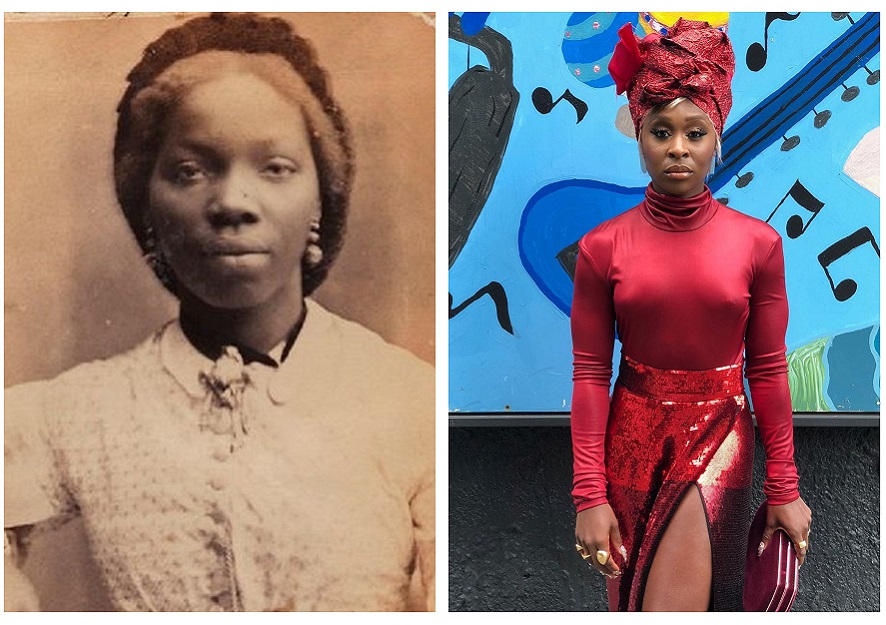Cynthia Erivo will star in and produce a film about an enslaved Yoruba girl who became a gift to the Queen of England
Cynthia Erivo is set to star in and produce a film about Sarah Forbes Bonetta, the daughter of an African chieftain who was captured and presented to the Queen of England as a gift in 1850. Developed by BBC Film, the upcoming film will be “a celebration of Sarah, a modern, strategic and determined heroine who has found a way to embrace her darkness, her Africanness and ultimately find love: forging a path that honors both her heritage and her upbringing.
Benedict Cumberbatch will serve as executive producer, with dual Oscar nominee Erivo and Solome Williams co-producing. Erivo, 33, said she was excited about the upcoming project.
“As a British Nigerian woman, to have the opportunity to tell the story of another British Nigerian woman who has so far been erased from the history books, is an honour.
“Miss Sarah Forbes Bonetta, Omoba Aina, is truly a passion of mine and I’m so glad I was able to find partners in the incredible women, Leah Clarke and Rienkje Attoh, to tell the story and finally give it a voice. I can’t wait to dive into her story, she is indeed the forgotten princess, forgotten no more.
Born into a West African royal dynasty, Bonetta, originally named Aina, was captured by King Gezo of Dahomey during a slave-hunting war in 1848. Her parents were killed during the war and, as the daughter of an African chief, Bonetta was kept. in captivity as a prisoner of state. Being the princess of the Egbado clan of the Yoruba people, she had to be presented to an important visitor or sacrificed after the death of a minister or official to become their assistant in the outside world.
In June 1850, when she was about eight years old, Bonetta was rescued by Captain Frederick E. Forbes of the Royal Navy while visiting Dahomey as an emissary of the British government. Forbes asked the King for the baby girl to be given to Queen Victoria as a gift. Bonetta initially stayed with the Forbes family, before being taken to Windsor Castle on November 9, 1850. She was received by Queen Victoria and Prince Albert. The Queen turned Bonetta over to the Church Missionary Society and paid for her education.
Bonetta, a year later, developed a cough believed to be caused by the British climate. The Queen arranged for her to be sent to Sierra Leone for a better climate. There, Bonetta attended the Freetown Women’s Institution. But when she was 12, the Queen ordered Sarah back to England, where she was placed in the care of the Scheon family in Chatham.
Bonetta became very intelligent and developed a special talent for music. His academic prowess won the Queen’s admiration as she gave him a social allowance and allowed him regular visits to Windsor Castle.
In 1862 Bonetta married James Pinson Labulo Davies, a 31-year-old Yoruba businessman who lived in Britain. The two returned to West Africa and settled in Lagos, where her husband became a member of the Legislative Council from 1872 to 1874. Sarah also began teaching at a school in Freetown. She gave birth to a daughter and obtained permission from the Queen to name her Victoria. The queen also became his godmother.
In 1867 Sarah visited the Queen with her daughter and returned to Lagos, where she had two more children. Following the climate change between Africa and Britain, Sarah’s cough returned. She died in her forties in 1880 after suffering from tuberculosis and was buried in Funchal, Madeira.
Her daughter, who was equally brilliant, was looked after by the queen and was always allowed to visit the royal household throughout her life.
During her lifetime, Bonetta was described by Captain Forbes as “far ahead of any white child of her age in learning ability, strength of mind, and affection”.
English Heritage, as part of its new project to highlight forgotten black stories and figures in British history, unveiled a portrait of Bonetta in October. He said the painting would hang throughout this month at Osborne House – Queen Victoria’s home – where Bonetta spent time with the monarch before her death.


Comments are closed.